"I'm motivated by a fantasy that the Lukashenka regime will come crashing down before I finish my daily count". How an American supports political prisoners
Ernie Barbarash is an American film director, screenwriter, and producer. He himself comes from a Jewish family and was born in Odessa, Ukraine. Every day on his Twitter account, for over a year now, Ernie Barbarash has been sharing a short story about one of the Belarusian political prisoners and ways to support them. Last year, the film director joined the Day of Solidarity with the political prisoners of Belarus and created a collage from the movie "Storming the Bastille," using photographs of the prisoners. To learn more about Ernie Barbarash's connection to Belarus, why he started talking about political prisoners, and where he finds motivation for his work, read the interview in Viasna.
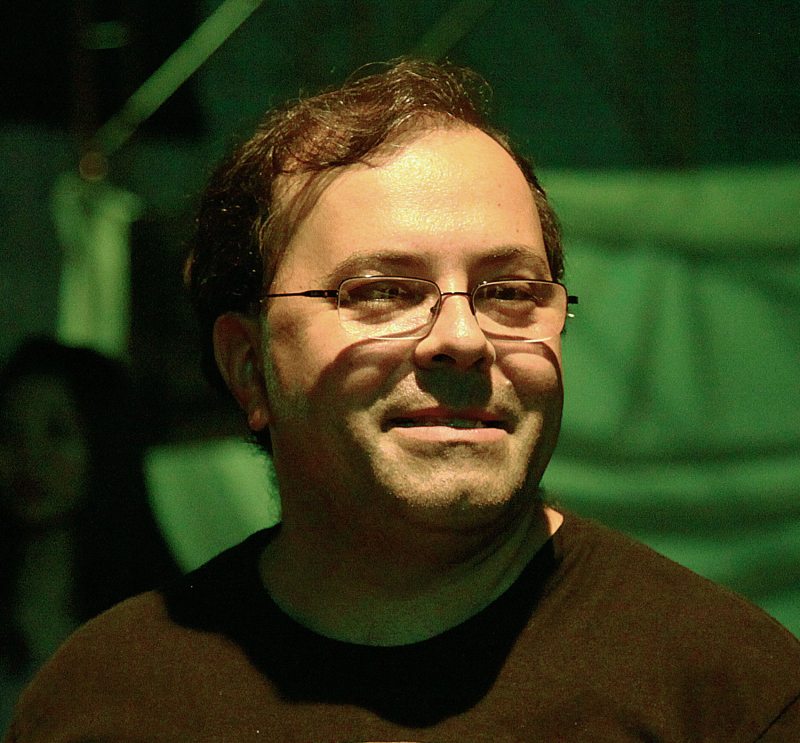
- Ernie Barbarash. Photo by prabook.com
“I started my project of posting one photo per day of a Belarusian political prisoner when I heard about imprisoned philosopher Uladzimir Matskevich starting his dry hunger strike, mid-February of 2022. Because Covid closed down all borders, I was unable to do much from afar during the protests in 2020 and I kept feeling like I had to do something other than just post articles on social media and I suddenly had this spontaneous idea for a daily task that would remind everyone that these very “normal”, “ordinary”, and yet very extraordinary people, were continually being swallowed up by the Lukashenka regime for actions that would never be considered a crime pretty much anywhere else in the world other than North Korea or, these days, post-invasion Russia.”
“And in posting not just pictures but also information on how people could help by writing to prisoners or donating money to help them and their families, I thought I could help expand the circle of people who could turn their desire to help into action.”
Ernie Barbarash was born in Odesa and immigrated to North America with his parents when he was 9 years old, giving him a lifelong connection to and interest in countries that were once part of the USSR. Having the ability to speak and read some Russian, he can stay updated on news sources that provide more immediate information compared to American press.
“I was tragically ignorant of Belarus and its specific situation & modern history until around 2010-2011, when I was directing my first action movie with Jean-Claude Van Damme.”
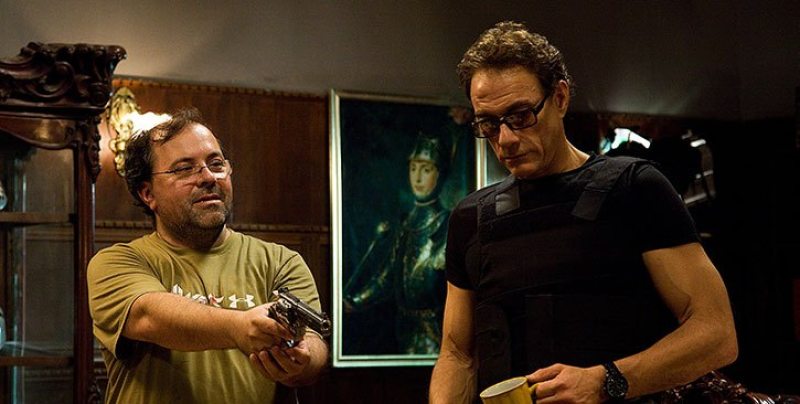
- Ernie Barbarash and Jean-Claude Van Damme. Photo by prabook.com
Their American producer sent them to scout locations in several Eastern European countries, and at the last moment, asked the crew to check out Belarus.
“The moment we landed in Minsk, I felt that this was very different from Romania and Slovakia :), where we had been scouting before. You could say that certain childhood memories flooded in… The first person I met on that trip was Valery Tsapkala, who was then head of the High Technology Park that he had created, and we've remained friends since. On that same trip in 2010-2011, the morning before my American producers and I went for meetings at the main Minsk film studio to discuss the possibility of shooting our film in Belarus, I opened up my laptop in the hotel cafeteria and tried to do some research on Belarusian filmmakers, cinematographers, just to understand the work people were doing…”
“The first names that came up on Google were Dzmitry Zavadski, the cameraman who had disappeared, as well as Viktar Dashuk and his documentary films about the regime, which then led me to look up other people who had been made to disappear, Hanchar, Krasouski, Zakharenka, etc...”
“So you can just imagine, there I was going to meetings with representatives of the government at the time, while realizing the kind of regime we were dealing with… Needless to say, we did not end up shooting our action movie in Belarus (we shot in Romania instead). The official/practical reason was that there was not enough time to set up the systems in place because we had to shoot very quickly. The underlying reason was that we all felt that we could not make a film that supported economic ties with the Lukashenka dictatorship. To his credit, Valery Tsapkalo did also introduce us to several more independent producers in Minsk that weren’t directly tied to BelarusFilm, but finally, the Hollywood studio that was financing us felt that even if one was to put morality aside, it was too risky to do business with the dictatorship.”
So over the years, since 2010, Ernie has followed Belarus in the news, interviews, documentary films, theatre performances, etc.
“When Valery Tsapkala told me that he was running for president against Lukashenko, I was of course worried for him & Veronica and his kids, and was even thinking I could come and film the campaign and other campaigns in 2020, but then of course Covid hit, the world closed down and I was forced to watch and listen from far away as the election campaigns happened, Viktar Babaryka and Siarhei Tsikhanouski were jailed on ridiculous trumped up charges before they could even run, Valery Tsepkalo was “disqualified” despite having more than enough signatures, and then this extraordinary symbolic phenomenon happened with Sviatlana Tsikhanouskaya, Marya Kalesnikava and Veranica Tsapkala coming together to become the face of the opposition — only to have the election stolen (again), the various phases of demonstrations, repressions, tortures, murder, people escaping the country, all these people starting to be rounded up, everything...”
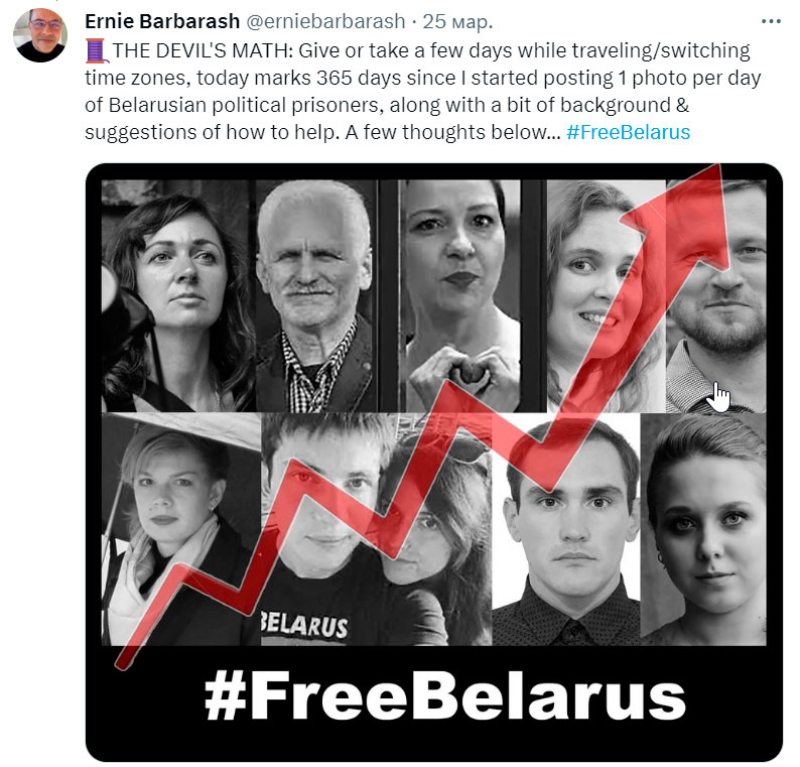
- Screenshot from Ernie Barbarash's twitter page
Then, last year, Ernie started to do serious research, meetings and interviews for what will become at least one or several film projects about Belarusians confronting the regime — both documentary and feature film based on real life stories.
“This came from realizing that I spent my life making up stories about fictional heroes and heroines, but in the real people who continue to fight the Lukashenka regime, I keep finding stories of true real life heroes in every sense of the word.”
“I can’t go into too much detail right now, but over the past year, I have had the honor and pleasure of meeting Belarusians who confront the regime, from many different professions, from political leaders and activists who have the highest visible profile to everyday people who have family behind bars and are trying to make a life and a living in foreign countries, to journalists, artists, media managers, social workers, psychologists, community activists and former government agents and police who are now battling the regime from the outside. Many of these people have close friends, family, in some cases spouses, parents, children, sisters and brothers who are behind bars in Belarus. I consider a number of these people real friends now and only hope they do the same as me.”
“Over the last few years I find myself more and more connected — more so because of trying to help people both through raising awareness, fundraising, directly sending things to help people inside Belarus when possible, than because of anything I do for my film project(s).”
“It’s almost as if trying to help directly and raise awareness has somewhat overtaken my film projects, but I have no problem with that because so many people need help. And Putin’s invasion of Ukraine has made the need for awareness more urgent because the fight for a free Belarus is no longer in the news cycle as much and, even worse, people misunderstand and mix up Belarusians and the regime’s allegiance to Russia and yet everyone still needs just as much help as before.”
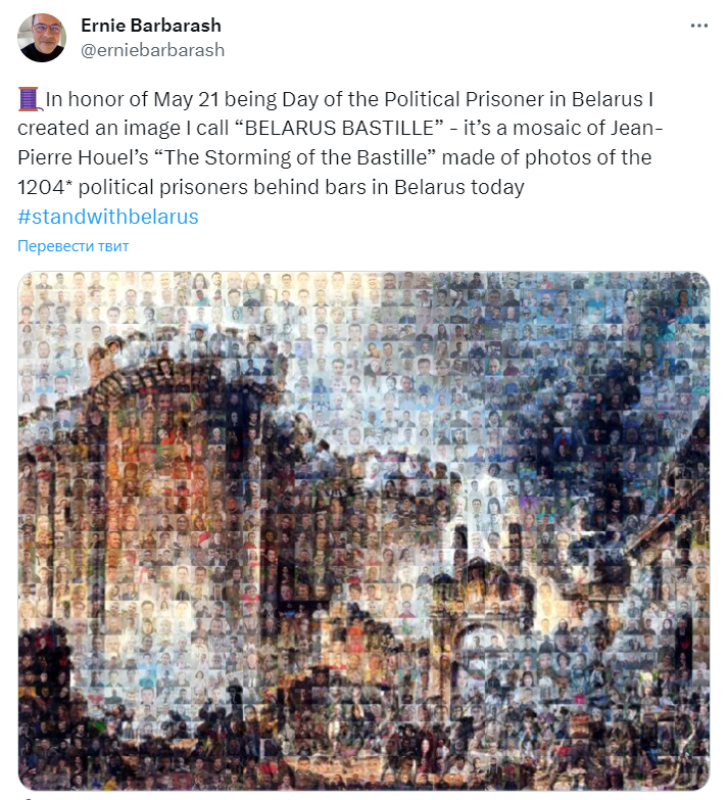
- Screenshot from Ernie Barbarash's twitter page
We asked Ernie, what motivates him to support political prisoners and how he feels about the fact that it will take years to write about all of these political prisoners.
“There are a number of factors that keep me motivated.”
“The first are the prisoners themselves, the heroism of innocent people taken away for nothing more than protest, their stories, ranging from active resistance to the regime to the absurdity of being jailed for a comment on social media. I feel like we owe it to them to keep the fight going. They stood up for what they believed was right and were crushed for it. They can’t fight from the inside — but we’re out here, we’re free, it’s our duty to continue the fight. The injustice and insanity of what happens to people in Belarus, in a modern country in the middle of Europe, drives me crazy — the more I read and hear about these people and their families left without them, the more I want to help.”
Tragically, this is no longer just an academic exercise for him too - since the end of last year, a friend with whom Ernie was in constant contact for over a year about some projects, both hers and Ernie’s, was taken away and is now looking at years in a penal colony.
“I try to help her family as much as possible, but with conditions as they are, this is complicated. And everyone I’ve met over the last year has some close friend or immediate relative behind bars too. So whenever I think of any political prisoner I now think of someone I actually know there too — and it makes it more immediate and more urgent to help.”
Ernie admits that there are selfish aspects to this that motivate him too.
“As I told Tatsiana Khomich when she was kind enough to take the time to talk to me a few times last year, I find it inspiring & important to have a very specific task, once a day, to post about political prisoners, no matter what — it reminds me that even though my work as a freelance filmmaker is filled with “crises” of various kinds, nothing I deal with in making up fictional movies is really that important. It is a really sobering perspective and I’m grateful to have it. I just wish it didn’t come at that high a cost to innocent people.”
“It is a really sobering perspective and I’m grateful to have it. I just wish it didn’t come at such a high cost to innocent people.”
“I am strangely motivated by a probably ridiculous fantasy that the Lukashenka regime will come crashing down before I finish my daily count of thousands of political prisoners. Maybe this is helped by the tragic fact that the repression machine can never actually stop feeding itself on innocent people that dare speak up even a little against it... And one day, I hope I can return to film a movie in a new Belarus where I would be proud to work with Belarusian artists and craftspeople and do my very small part to help bring the international film industry to a country free from dictatorship that has such talented people in it.”
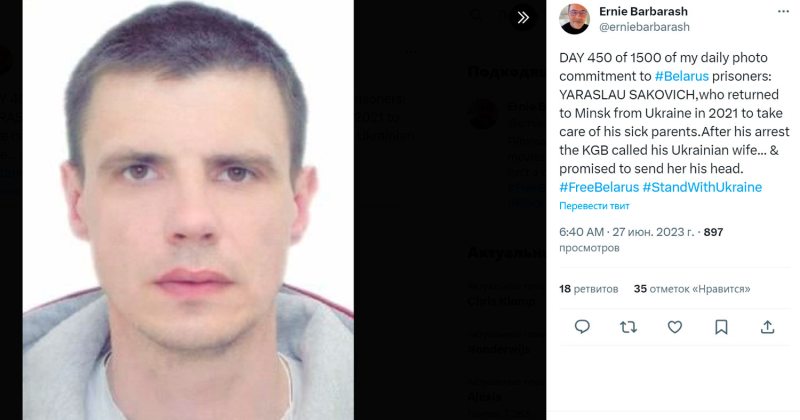
- Screenshot from Ernie Barbarash's twitter page
Ernie Barbarash has no practical way to really track how many people are reached by his posts on Twitter, Facebook, and Instagram and what those people do after reading — he certainly doesn’t have the reach of many more famous people in his industry. But he does get reposted more and more as time goes on, and he does often hear, especially from people in America and Canada, that they would never know about anything that’s going on in Belarus if it wasn’t for his posting about political prisoners and some news articles.
“Of course the most positive responses are when I hear from people who message me saying that they actually wrote postcards to specific prisoners I posted about, or donated money to funds.”
“I am going to try and do more specific public fundraising efforts as well. I don’t have illusions about having a huge impact in terms of numbers, but I believe that if I can help give hope to even one person suffering behind bars because someone writes them a letter or one more family can get help because someone sends them some money, my relatively small effort, even over years, will have been worth it.”
When asked about giving other people advice, Ernie Barbarash acknowledges that there are much more experienced individuals in human rights work who can offer it. However, he can suggest that people engage in any and all actions within their capacity. Even small gestures, mentions, actions, donations, and assistance can make a difference. Ernie has found that committing to a small daily effort over an extended period proves effective, as it keeps him engaged, encourages him to think of additional ways to help, and fosters connections with individuals and organizations that can provide support. Being active and involved consistently yields results, as opposed to simply complaining.
“I am always reminded of one of my favorite quotes from Eleanor Roosevelt: “It is better to light a candle than curse the darkness.”

















